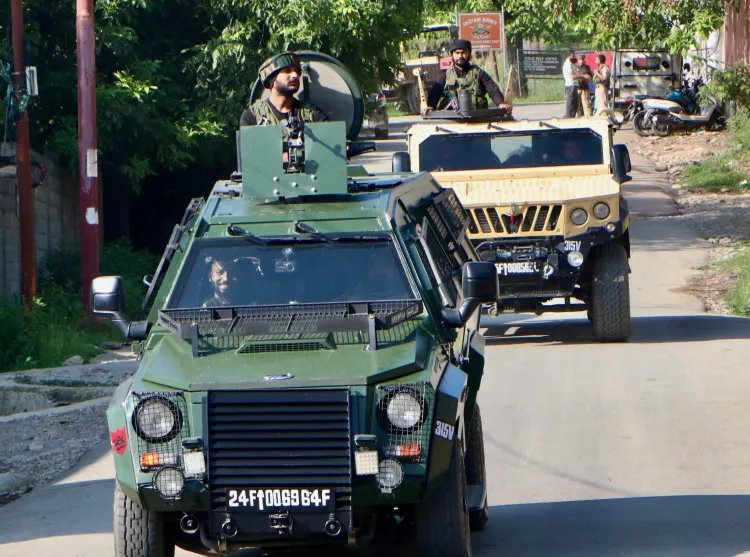What is the Current Status of the Anti-Terrorist Operation in J&K's Kulgam District?

Synopsis
Key Takeaways
- Operation Akhal has reached day seven, indicating an extended effort against terrorism.
- Joint Forces are using advanced technology to combat threats.
- Focus on dismantling the entire terrorism ecosystem is crucial.
- Operation Mahadev addresses significant terrorist threats.
- Drug trafficking is linked to funding terrorism.
Srinagar, Aug 7 (NationPress) The anti-terrorist operation in the Akhal forest region of Jammu and Kashmir's Kulgam district has now reached its seventh day as the GOC-n-C of the Army’s northern command conducted a review of the counter-terrorism framework in the southern districts of Kashmir.
The operation began last week when joint forces initiated a cordon and search operation (CASO) following intelligence reports indicating the presence of a terrorist group in the area.
In the initial confrontation, one local terrorist was eliminated while another sustained injuries during the exchange of gunfire with the security forces.
Four army personnel were injured and promptly transported to a medical facility for care.
On Thursday, officials reported, "Operation Akhal persists, with significant firing and explosions echoing throughout the night. This operation may extend for several days, potentially becoming the longest in Kashmir in decades."
Meanwhile, Northern Army Commander Lt General Pratik Sharma visited Devsar to assess the Counter-Terrorism Grid in South Kashmir, where he received updates on the security landscape, operational readiness, and the ongoing missions.
The Army has deployed Rudra helicopters, drones, and Para Commandos to prevent the terrorists from escaping.
Security forces are undertaking rigorous operations against militants in the hinterland while the Army maintains maximum vigilance along the Line of Control (LoC) in Jammu and Kashmir.
The neutralization of three core Pakistani terrorists linked to the April 22 Pahalgam attack, which resulted in the deaths of 26 civilians, is a key element of the aggressive operations conducted by the joint forces.
Three prominent Pakistani terrorists, including LeT commander Suleman Shah and his associates Abu Hamza and Jibran Bhai, responsible for the Pahalgam attack, were killed on July 28 in the elevated regions of Dachigam National Park, near the Mahadev mountain peak in the Harwan area of Srinagar.
The Army has designated this initiative as 'Operation Mahadev.' Following the Pahalgam terror incident, security forces have intensified their anti-terrorism operations targeting armed terrorists, their overground workers (OGWs), and sympathizers.
Drug traffickers and smugglers are also under scrutiny, as it is believed that the revenue generated through hawala and drug trafficking supports terrorism in Jammu and Kashmir.
The joint forces' coordinated and intelligence-driven operations aim to dismantle the entire ecosystem of terrorism in Jammu and Kashmir, focusing on more than just the elimination of armed terrorists.









